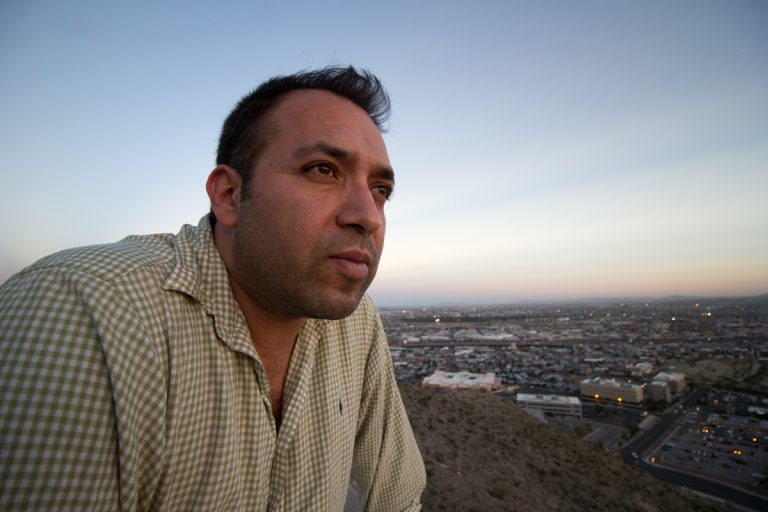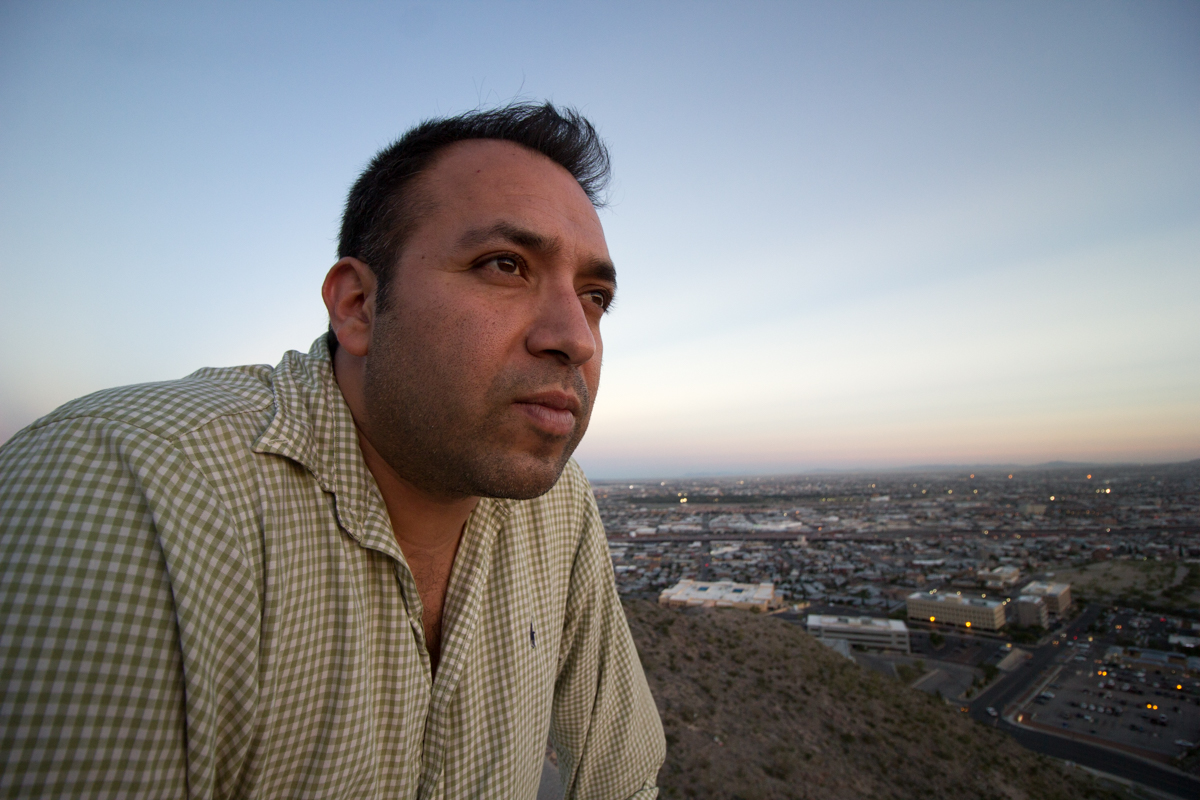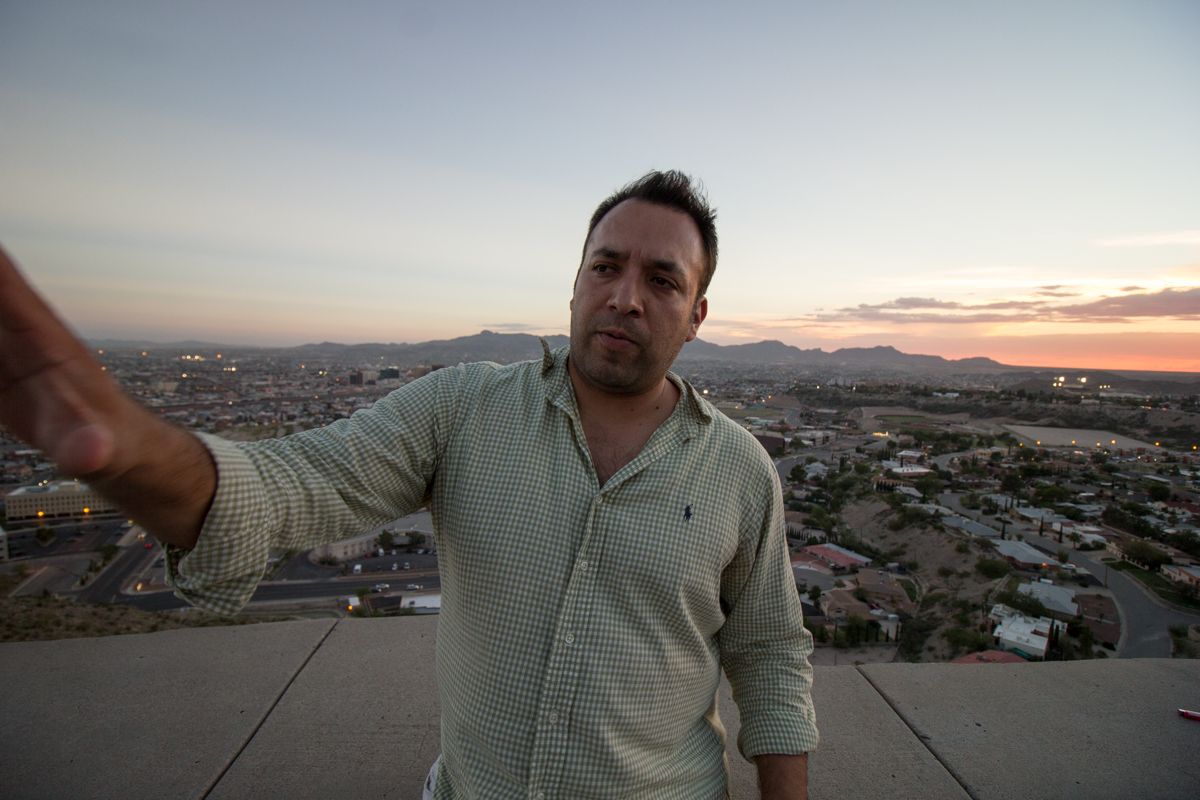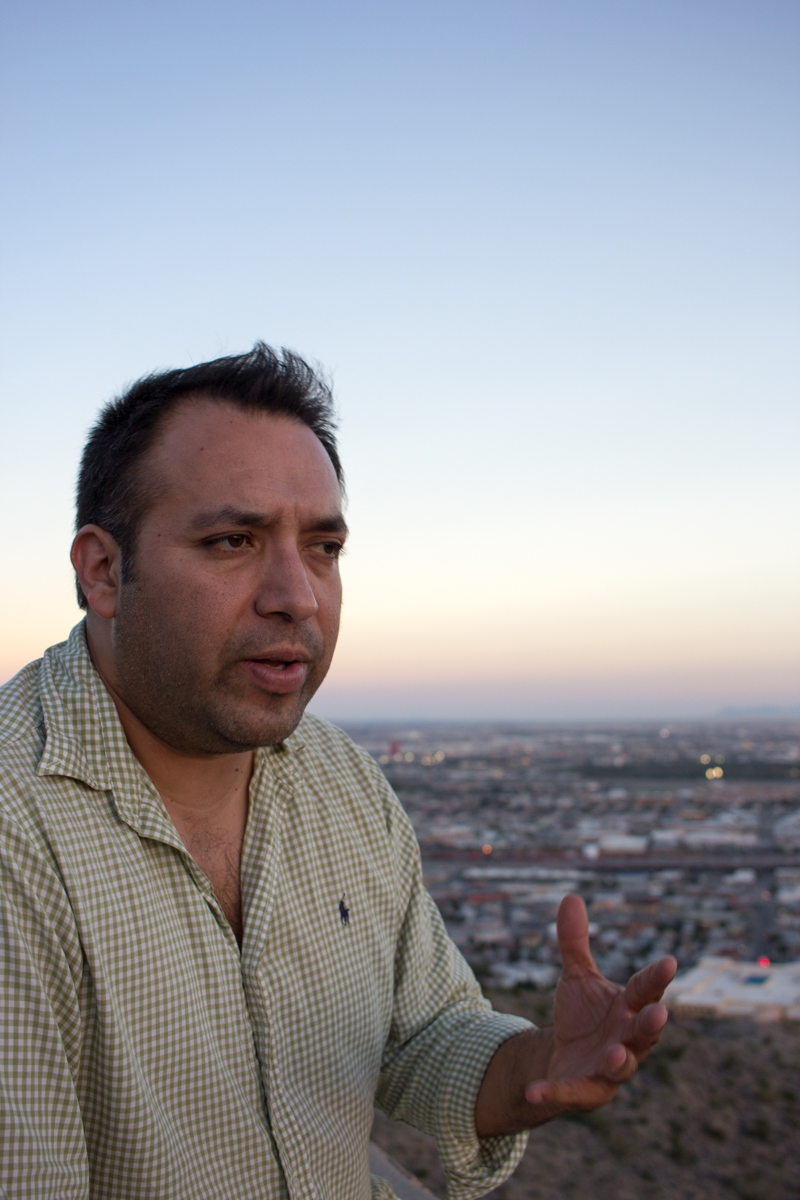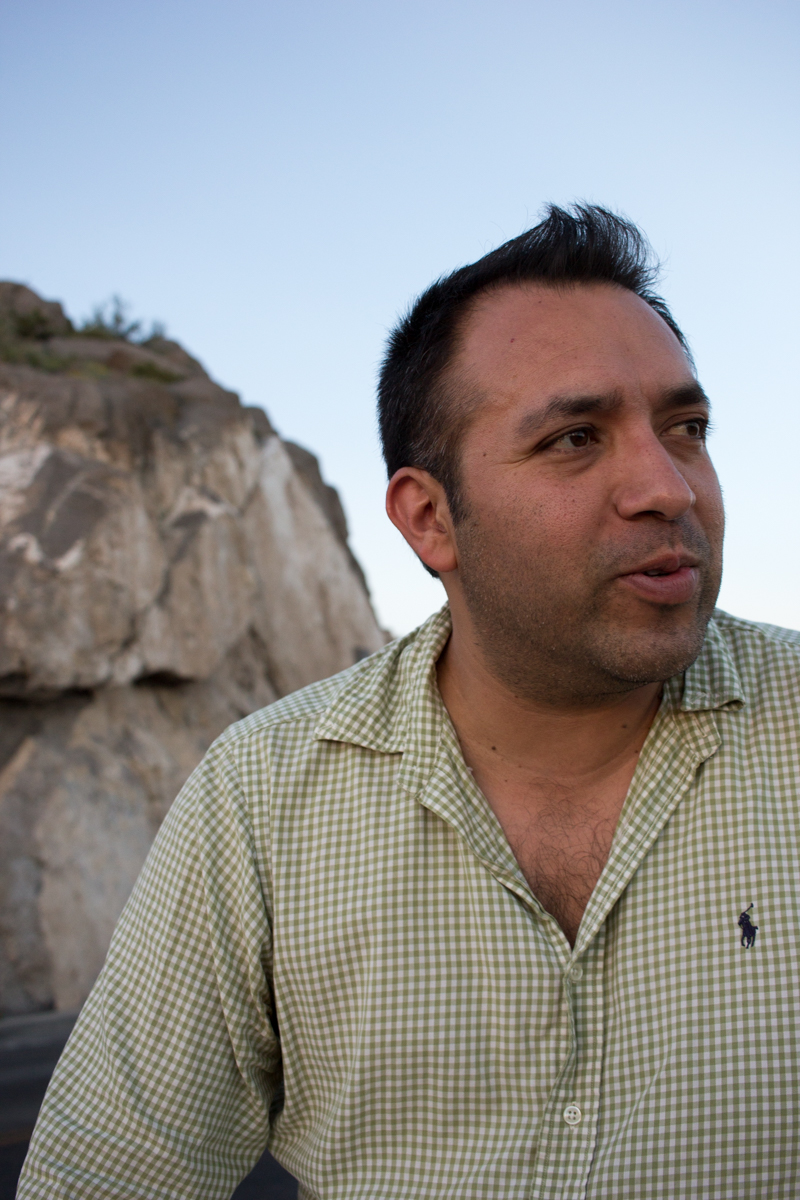Text: Denise Nelson Prieto | Photos: Alex Durán
At any given time you’ll find Valentin Sandoval involved in some manner of artistic endeavor. Whether he’s working on promotional material to market a friend’s art work, helping a colleague write dialog for a feature film or working on a follow-up to his award-winning literary debut, South Sun Rises, Sandoval is a creative lightning rod.
Sandoval was recently in Albuquerque doing some marketing and multimedia videos for an artist’s friend.
“What I’m doing with my friend in Albuquerque is directly related to policy making and bringing awareness,” he said. “I do think it is an artist’s responsibility to do that; the artists that leave an impression on us, on culture and society, [have] an intuitive awareness of what a cultural ethic is and what role art plays in forming culture and forming policy.”
In a brilliant display of a product of his environment, Sandoval has no glut of experiences to draw from when creating a particular character for a film or literary work, or endowing existing characters with a specific voice. Bouncing from to school to school during his formative years, hanging out on the streets of South El Paso, imbibing all the raucousness and vibrancy of Juarez and being absorbed into the Latino and Puerto Rican fabric of New York City—collectively these scenarios have imbued Sandoval with a rich, diverse matrix of perspectives and provided a wellspring of stories.
“My core competency as a writer or film maker is basing it off of real experiences; it’s not always lived experience . . . but there is a common ground of some kind of perseverance over some kind of border, whether it’s a psychological or a physical border, or an injustice. I like to think the exploration of my work within that frame is able to present the issue at hand and bring clarity to the complexities [within it].”
Those borders Sandoval refers to are rife throughout South Sun Rises, a bilingual collection of stories written in poetic prose. The book, which garnered the esteemed Southwest Book Award from the Border Regional Library Association this past February, is a personal narrative which recounts Sandoval’s upbringing by a single mother, along with his siblings and an absentee father. Occasionally the narrator takes on the voice of Sandoval’s mother who struggled to raise 4 kids on her own, while holding down multiple jobs, and continuously strove to provide for her children’s physical, emotional and spiritual needs. The narrator vacillates between the matriarch and a father figure, who is a collective representation of Sandoval’s own dim memories of his dad, other male family members and an assortment of friends and acquaintances amassed over the years.
Sandoval, who is 39, includes in his wide-ranging portfolio a film titled Instrumento. The effort, which he produced at the young age of 19 while studying film at UTEP, garnered him the university’s first-ever award for Independent Filmmaking in 1996. The film reveals the story of an idealistic guitar player who is the character foil for the plot’s fatalistic young heroin addict. Sandoval explained the development of the 2 main characters:
“He [the junkie] was not any one person specifically, but an allegory of 2 or 3 different figures from where I grew up in lower valley. [The guitar player’s] innocence was the perfect balancing point for the friend’s toxicity, torment and affliction.”
Recently Sandoval lent his writing prowess to a film maker friend in Los Angeles to help develop some very specific dialogue for a feature film and do a voice-over for one of the movie’s main characters.
Sandoval has also produced several documentary films. One such project titled Las Corrientes de la Frontera, is a film by Jaime Chavez. It is an examination of the land rights struggles that resulted with the inception of NAFTA and experienced by farmers and indigenous people in Bocoyna, Mexico, south of Chihuahua. Sandoval spent about a week in Bocoyna, camped out with the indigenous Tarahumara Indians and shot footage for the film.
In 2004 Sandoval was granted the award for Best Documentary at the UTEP International Film Festival for his work on Clamor, a look at the writing workshops conducted at a federal prison in California by celebrated poet and ex-convict, Jimmy Baca, in his effort to forge prison literacy and sign language communication. Sandoval explained the impetus for the film:
“I had pitched to him [Baca] the idea of documenting his writing workshops in prison. At the time I was about 22, and I had a couple cameras. He had a light bulb go off in his head, so one of his agent’s called me up to see if I wanted to go to L.A., to Chino Prison, to go film a workshop; I jumped on the opportunity. As a matter of fact Peter Jennings’ crew, when he was alive, was there doing a story for ABC [News], and I had to fight for camera angles with his Japanese photographer while I’m shooting the writing workshops in Chino Prison. That was riveting, you know these guys were signing their poetry, writing poetry but using sign language.”
Part of the reason Sandoval works in the medium of film hinges on his desire to expose the truth, whether it be through recounting actual events, or conveying them with embellishments and improvisation. Each artist’s “truth” is not necessarily a conveyance of factually accurate events, but rather his/her personal perspectives which tinge the truth.
“In the few times that my work has been effective has been the result of taking a real issue, putting my head to the grindstone, and figuring out what the story really is, and what most creative angle I can take on it, and make it into something riveting”
Among Sandoval’s professional accomplishments is his work with “Mi Familia Vota,” a national non profit that aims to unite the Latino community and increase social and economic equality through increased civic participation. During President Obama’s reelection campaign, Sandoval traveled to 24 cities with former secretary treasurer of the Service Employees International Union, Eliseo Medina, in an effort to increase Latino voter turnout.
He also produced Public Service Announcements for Centro de Salud Familiar La Fe several years ago which addressed underage drinking and other issues, as well as wrote and coordinated plays that dealt with certain health issues affecting particular disenfranchised demographics throughout El Paso. He served as the center’s Teatro Bienestar coordinator, whereby he hired writers to develop plays such as “Señora de la Fuente” and “La Salud de mi Familia.”
The offer for that job came at a somewhat inopportune time in the course of Sandoval’s career. He explained:
“I had been given a job offer to work on a Miramax film that was in town called Committed with Heather Graham and Casey Affleck. . . the cinematographer came into town, we went around town, we had some drinks and he liked my mindset, and he called me a week later and asked me if wanted the first assistant camera job. He said ‘Hey I have about 8 people waiting for me in L.A. to call them back and give them the job. You’re not as technically skilled as they are, but that you can learn; you have a certain eye, and I’m offering you the job.’ Right before he’d offered me that job, Leo Martinez [currently with local band Los Chamukos] and his girlfriend at the time called me with a job offer at the La Fe clinic as their Teatro Bienestar coordinator. I said ‘This is the universe talking to me; this is God asking me what are you going to be about?’ I trusted my instinct and took the Teatro Bienestar job.”
Sandoval sees that experience as a certain anchor point in his life which helped him to step outside himself and gain a deeper perspective, a transformation that proved to be intrinsic in the letting go process. For him, dispossessing himself of a narcissistic worldview crept into his art, thus rendering an overall superior product.
Additionally Sandoval did some multimedia production work for former state senator Eliot Shapleigh, as well as campaign work for former New Mexico Attorney General, Gary King.
Currently he is collaborating on his second book with local entrepreneur, Don Shapiro.
“It is an exploration of the American dream within the context of the borderland and the visionaries who put it on the global map,” Sandoval explained.
A documentary with UTEP professor Tim Z. Hernandez is also queued up. The film expounds on the premise behind Woody Guthrie’s song “Plane Wreck at Los Gatos/ Deportee,” which tells the story of the 32 people killed in a plane crash in 1948 near Los Gatos Creek near Coalinga, California. Sandoval is producing and directing the film, which is due out next February.
On the academic front, Sandoval currently with Dr. Maria Martha Chavez on her “Catch the Next” project, a program aimed at college readiness geared toward Latinos.
Sandoval has undertaken the mission of telling amusing, interesting stories which immediately engage the audience, enveloping him/her within the story. He goes deeper, though, in that he has co opted various mediums and created characters to which society at large can connect with by virtue of a common struggle, whether it be political, emotional, or physical, thereby tugging at our heartstrings and rendering a shared experience.


